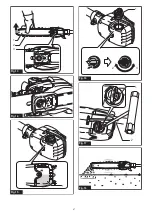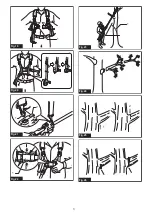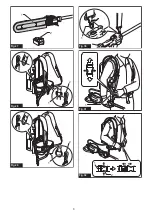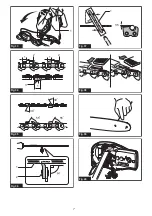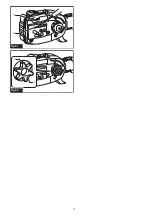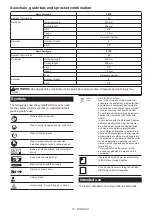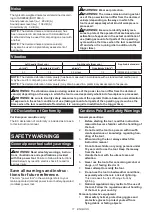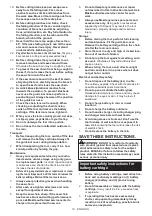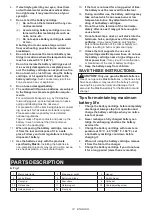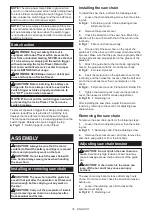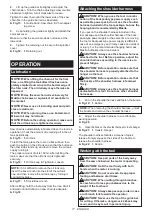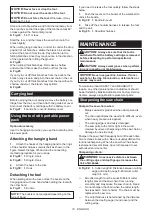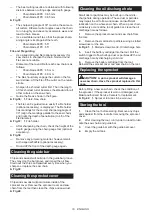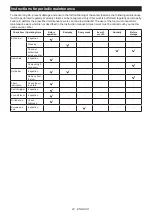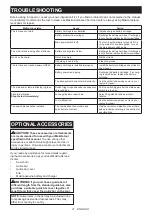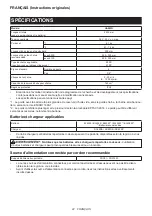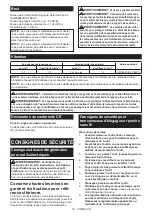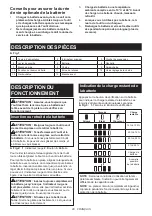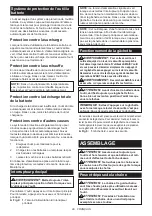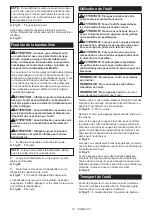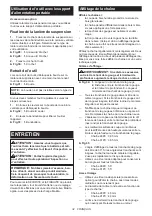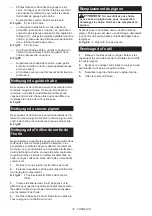
18 ENGLISH
NOTICE:
Never toss or drop the tool.
NOTICE:
Do not cover the vents of the tool.
NOTICE:
Do not force the tool.
Otherwise, it may
damage the tool.
Stand on a stable surface, and hold the tool away from
the branches so that the angle of the tool becomes 60°
or less against the horizontal ground.
►
Fig.23:
1.
60° or less
Start the tool, and then press the saw chain onto the
branch lightly.
When cutting long branches, in order to control the drop
position of cut branches, divide the branch in sections
and cut the branch from the tip. Pay attention to the
falling branches since they may bounce in the direction
of the operator after hitting the ground.
►
Fig.24
When cutting thick branches, first make a shallow
undercut and then make the finish cut from the top.
►
Fig.25
If you try to cut off thick branches from the bottom, the
branch may close in and pinch the saw chain in the cut.
If you try to cut off thick branches from the top without a
shallow undercut, the branch may splinter.
►
Fig.26
Carrying tool
Before carrying the tool, always remove the battery car-
tridge from the tool, and then attach the guide bar cover.
Also cover the battery cartridge with the battery cover.
►
Fig.27:
1.
Guide bar cover
2.
Battery cover
Using the tool with portable power
pack
Optional accessory
Use the hanging band when you use the tool with porta-
ble power pack.
Attaching the hanging band
1.
Attach the hooks of the hanging band to the rings
of the shoulder harness or waist belt as shown in the
figure. Select the type of band and the connecting
method appropriate for your usage.
►
Fig.28:
1.
Ring
2.
Hook
►
Fig.29:
1.
Ring
2.
Hook
2.
Attach the hook to the tool.
►
Fig.30:
1.
Hook
Detaching the tool
When setting down the tool, unlock the buckle on the
hanging band with one hand while holding the tool with
the other hand.
►
Fig.31:
1.
Buckle
NOTE:
The buckle is not equipped depending on the
type of band.
If you need to release the tool quickly, follow the steps
below.
1.
Push the levers on the buckle of the waist belt to
unlock the buckle.
►
Fig.32:
1.
Buckle
2.
Lever
2.
Take off the shoulder harness to release the tool
and the unit.
►
Fig.33:
1.
Shoulder harness
MAINTENANCE
CAUTION:
Always be sure that the tool is
switched off and the battery cartridge is removed
before attempting to perform inspection or
maintenance.
CAUTION:
Always wear gloves when perform-
ing any inspection or maintenance.
NOTICE:
Never use gasoline, benzine, thinner,
alcohol or the like. Discoloration, deformation or
cracks may result.
To maintain product SAFETY and RELIABILITY,
repairs, any other maintenance or adjustment should
be performed by Makita Authorized or Factory Service
Centers, always using Makita replacement parts.
Sharpening the saw chain
Sharpen the saw chain when:
•
Mealy sawdust is produced when damp wood is
cut;
•
The chain penetrates the wood with difficulty, even
when heavy pressure is applied;
•
The cutting edge is obviously damaged;
•
The saw pulls to the left or right in the wood.
(caused by uneven sharpening of the saw chain or
damage to one side only)
Sharpen the saw chain frequently but a little each time.
Two or three strokes with a file are usually sufficient for
routine resharpening. When the saw chain has been
resharpened several times, have it sharpened in our
authorized service center.
Sharpening criteria:
WARNING:
An excessive distance between
the cutting edge and depth gauge increases the
risk of kickback.
►
Fig.34:
1.
Cutter length
2.
Distance between cutting
edge and depth gauge
3.
Minimum cutter
length (3 mm)
— All cutter length must be equal. Different cutter
lengths prevent the saw chain from running
smoothly and may cause the saw chain to break.
— Do not sharpen the chain when the cutter length
has reached 3 mm or shorter. The chain must be
replaced with new one.
— The chip thickness is determined by the distance
between the depth gauge (round nose) and the
cutting edge.
Summary of Contents for UA003GZ
Page 2: ...2 3 1 2 4 5 6 7 8 9 10 11 12 13 14 Fig 1 2 3 1 1 Fig 2 1 2 Fig 3 1 2 Fig 4 ...
Page 3: ...3 2 1 Fig 5 2 3 1 Fig 6 1 Fig 7 1 2 Fig 8 1 2 3 4 Fig 9 1 Fig 10 2 1 Fig 11 1 Fig 12 ...
Page 4: ...4 1 2 3 Fig 13 1 Fig 14 1 Fig 15 1 2 3 Fig 16 1 2 Fig 17 Fig 18 ...
Page 5: ...5 1 Fig 19 Fig 20 2 1 Fig 21 1 Fig 22 1 Fig 23 Fig 24 1 2 Fig 25 Fig 26 ...
Page 6: ...6 1 2 Fig 27 1 2 Fig 28 1 2 Fig 29 1 Fig 30 1 Fig 31 1 2 Fig 32 ...
Page 8: ...8 1 2 Fig 41 2 1 Fig 42 ...

